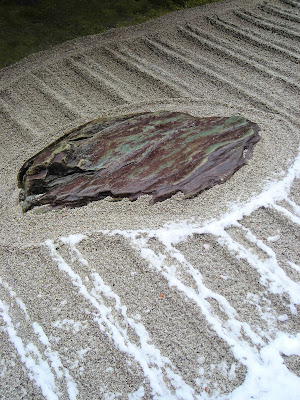The memory of ease
15th October 2006
Are religion and commerce natural bedfellows?
How you answer will depend on your level of cynicism but in at least one instance in Kyoto, the two rub together happily, naturally - and with a generous helping of pickles.
The monthly market at Chion-ji is one of the fairs held regularly on temple grounds in the city; Chion-ji's falls on the 15th of every month and specialises in handmade goods. The 15th of October happened to be a Sunday so when the day of the fair came, so did lots of people.
As I stood at the main entrance of the temple, I watched visitor after visitor climb up the steps, mutter 'sugoi na'* if male or 'sugoi ne' if female and inch into the throng. I was waiting for K.**, a kindly Taiwanese classmate whose interest in food, kimono and other old things made her a natural partner for Kyoto adventuring. She bobbed into view, jumping above the sea of heads so I could see her. She did the mandatory double-take at the size of the crowd and then we squeezed in.
It was impossible to wander freely from stall to stall; all we could do was shuffle. But though it was a claustrophobe's nightmare, I didn't see anyone losing his temper. People just organised themselves into long lines and shuffled stoically.
But having to creep past stalls meant that you looked that much more closely at what was there. The words 'handmade goods fair' somehow conjure up the image of things hammered together on weekends in someone's garage and though there was some of that at the market, this is, after all, a city of craftsmen and even the amateurs - some of the stall-holders looked like students - know their way around paint, cloth, wood and clay.
The goods encapsulated the Japanese fondness for cute things (sake cups with a tiny pig peering out***), their sensitivity to the seasons (autumn motifs everywhere) and their love of cute things sensitive to the season (postcards with a squirrel clutching a red leaf in one paw and an acorn in another).
And at Chion-ji, 'handmade goods' also cover vegetables. There were vegetables bigger than my head, vegetables smaller than my head and vegetables pickled in more ways than could fit in my head.
The lines of stoic shufflers may lead you to think that the fair was a sober, orderly affair. But while there didn't appear to be any bartering, there was bantering. Though, for some reason, this seemed to happen mostly with the vegetable sellers. Perhaps handling giant pumpkins and Unidentified Phallic Objects of the vegetable kind puts people in a jocular frame of mind.
So - what did I buy? Beautiful things, of course. But among the items that made me the happiest was a box of warabi mochi. If Turkish delight had found its way to Japan years ago and been recreated with bracken starch and dusted with kinako powder, you'd get something like warabi mochi. It's a gentle sweet, nothing like desserts that come dripping with promises of death by chocolate.
But for warabi mochi, I stood in a long line under a strong sun because the flavours you remember are not just those that burst through in a blaze of fireworks but also those which slip in to sit beside you and, in their speaking silence, comfort. They'll leave soon enough - as flavours tend to do - but when they are gone, the memory of ease remains.
. . . . .
* Meaning 'great', 'terrible' or 'Woah! Lots of (optional insertion of noun here)!' As with many Japanese words and phrases, the meaning depends on the context.
** Names in this blog have been changed to protect the guilty i.e. me.
*** See http://www.h6.dion.ne.jp/~seizo/
Thursday, October 19, 2006
Subscribe to:
Post Comments (Atom)

No comments:
Post a Comment